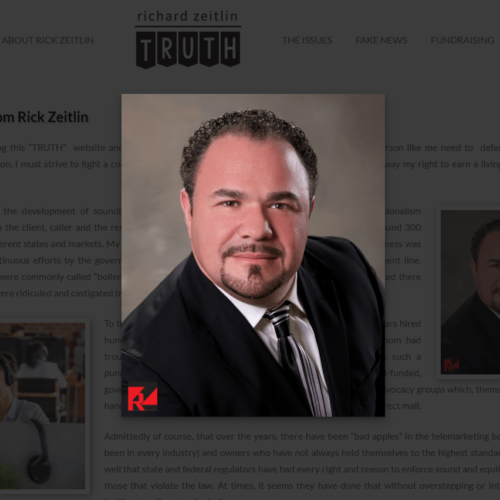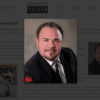Introduction
A Las Vegas telemarketer whose former companies were investigated by the Federal Trade Commission for possible “unfair or deceptive acts” has received taxpayer-funded loans meant to support small businesses struggling financially because of the COVID-19 pandemic.
Compliance Consultants LLC and Advanced Telephony Consultants LLC, both run by Las Vegas telemarketer Richard Zeitlin, received Paycheck Protection Program (PPP) loans in May totaling between $500,000 and $1.3 million, according to a database released by the U.S. Small Business Administration, which reports loan totals in ranges instead of exact loan amounts.
The SBA distributed the PPP loans as part of a package of coronavirus stimulus laws Congress passed in April.
Zeitlin was the focus of a Center for Public Integrity investigation published last year that found his companies, including Compliance Consultants, kept $133.1 million out of $153.1 million raised between 2006 and 2019 from American donors on behalf of political and charitable organizations. (Advanced Telephony Consultants was not part of Public Integrity’s investigation.) Zeitlin’s employees asked donors to help children with leukemia, women with breast cancer, police officers, firefighters and veterans, but very little of the money went to the causes they championed.
The FTC and attorneys general in various states shut down at least five of the charity clients that contracted with Courtesy Call, one of Zeitlin’s former companies, for allegedly misleading donors. Zeitlin was not a party in any of those lawsuits, nor were he or his companies accused of any wrongdoing.
However, the FTC was investigating whether two of Zeitlin’s former companies, Donor Relations and Courtesy Call, were “engaging in unfair or deceptive acts or practices,” according to a court document filed by the commission in February 2018.
But the companies did not cooperate, failing to meet deadlines and sending “patently inaccurate” documents, according to court documents filed by the FTC. The commission dropped its inquiry in late 2018, citing an ongoing grand jury investigation in southern Florida involving Courtesy Call and Donor Relations.
“It is clear that the [Paycheck Protection] program failed to vet loan applicants in any significant way and gave loans to companies that had been the subject of multiple government investigations,” said Brett Kappel, a campaign finance attorney with the law firm Harmon Curran.
Zeitlin’s attorney could not be reached in time for publication.
Public Integrity, which has fewer than 50 employees, received $658,000 under the PPP program.
Zeitlin’s telemarketing tactics are part of a growing trend. The U.S. has seen a spike in the number of political action committees that raise most of their money from small-dollar donors before plowing much of it back into salaries, administrative costs and raising more cash, according to a Public Integrity analysis of more than 68.7 million campaign finance records compiled by the Center for Responsive Politics.
PACs that contract with Zeitlin accounted for about half of that increase. Before shifting to PACs a few years ago, Zeitlin raised tens of millions of dollars in the name of charities.
By and large, nonprofits and political committees are allowed to spend almost everything they collect on fundraising. But it’s not legal to mislead prospective donors about how their money will be used. It is up to a patchwork of federal and state investigators, each with different jurisdictions and responsibilities, to police solicitors.
Some of the organizations that have contracted with Zeitlin’s firms over the years have been, or currently are, run by people with troubled histories, including a disgraced Florida lawyer and a board member of a charity that was shut down by regulators. Four of the groups are run by a Las Vegas Metropolitan Police Department officer who was accused in a federal lawsuit in 2018 of using “excessive and unreasonable force” when he shot a man armed with a knife six times, killing him. The lawsuit was dropped in 2019.
Following Public Integrity’s story, the Las Vegas police department said it was “looking into” the work that officer, William Pollock, was doing on behalf of political committees. A spokesperson for the department said Pollock voluntarily resigned on June 10. It’s unclear whether he was reprimanded or if his resignation was related to the findings about his work for PACs; the department said his personnel file is not public record.
Federal regulators have been cracking down on charities and political committees that spend most of the cash they raise on fundraising and overhead.
In February, a federal judge sentenced political operative Scott B. Mackenzie to 12 months and one day in prison for making false statements to the Federal Election Commission.
Mackenzie — one of Washington’s most prolific and controversial political fundraisers — has served as treasurer of more than 50 federal political action committees. At least a dozen of these purported to raise money for political and social causes, but they spent most of the money they raised from unsuspecting donors on fundraising, salaries and overhead.
In March, the Virginia attorney general’s office shut down two veterans charities that allegedly misused $13 million in donations from unsuspecting Americans.
The Circle of Friends for American Veterans and the Center for American Homeless Veterans were the focus of a 2017 Public Integrity investigation, along with Put Vets First! PAC, a related political action committee all based out of the same Falls Church office and run by retired Army Maj. Brian Arthur Hampton.
The organizations promised to help homeless veterans with food, shelter and job training, but they spent almost all of their money on professional telemarketers, which Public Integrity has also investigated.
Hampton contracted with Zeitlin’s companies for fundraising services.
As part of a settlement agreement with the state, Hampton was permanently banned from soliciting donations and from serving any financial role for other nonprofits.
He was also ordered to split $100,000 among three charities “which provide real support” to homeless veterans, according to a news release issued by Virginia Attorney General Mark Herring’s office.
Read more in Health
Coronavirus and Inequality
Read the White House’s secret coronavirus red zone reports
The Trump administration doesn’t make these reports public, but we’re collecting and publishing the COVID-19 data and recommendations for states and counties.
Coronavirus and Inequality
On private call, White House’s Birx recommends robust testing for colleges
The advice comes as nine states remain in the ‘red zone’ and some universities see outbreaks.





Join the conversation
Show Comments